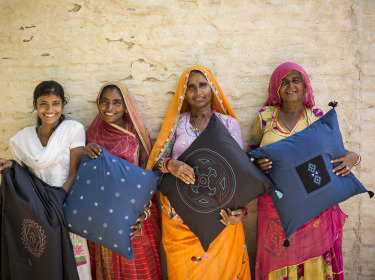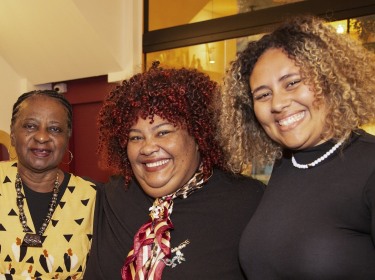Every year on 8 March, the world observes International Women’s Day. This March, IKEA Social Entrepreneurship recognises the work of the female entrepreneurs we support. Join us every Friday this month as we celebrate some of these remarkable women and how they’re contributing to a more sustainable and inclusive world.
Today, we feature Ika Juliana, the founder and CEO of Greenie in Indonesia. Greenie empowers farmers and artisans by turning areca leaf sheath into reusable materials for home furniture and decor.
Greenie has been supported by our I-SEA, our Indonesian accelerator programme co-created by IKEA Social Entrepreneurship and Instellar.
Today, we feature Ika Juliana, the founder and CEO of Greenie in Indonesia. Greenie empowers farmers and artisans by turning areca leaf sheath into reusable materials for home furniture and decor.
Greenie has been supported by our I-SEA, our Indonesian accelerator programme co-created by IKEA Social Entrepreneurship and Instellar.
Green chemistry for a greener future
In Jambi province, Indonesia, areca farming is one of the city’s main sources of income. The areca palm fruit produces betel nut which is a primary export product for the region and the Indonesian government aims to make it their leading export commodity.However, with such a large amount of farming for betel nuts comes a large amount of waste. The unusable parts of the areca plant are often burned, causing pollution and health problems for rural communities. To help reduce this waste and pollution, Ika Juliana founded Greenie Indonesia in 2020.
Ika’s journey with sustainability started when she was just 12, when she joined a competition to combat environmental issues in Bali. Since then, she has spent years researching green chemistry and sustainability and has been published in several international journals.
Through her research, Ika started delving into solutions for Indonesia’s agricultural landscape. She founded a social enterprise, Greenie, to educate and empower non-timber farmers, transform the home furnishing industry, and uplift farming communities.
Greenie collects areca leaf sheath waste from local farmers and SMEs in Jambi and recycles that waste into sustainable natural particle board for the home furnishing industry. This non-timber-based material uses a low-emission adhesive combined with agricultural waste, supporting carbon emission reduction in furniture. Yet, adapting peat palm into quality furnishings wasn’t simple. The process, striving to rival conventional wood quality, demanded rigorous experimentation.
This is a new practice in the home furnishing industry in Indonesia, where large areas of timber plantations exist for timber furniture and trade. However, “using areca leaf sheaths encourages responsible consumption, increases environmental awareness, and reduces reliance on logging activities,” says Ika.

Download Image
Download
USAGE RESTRICTION
THE FOLLOWING RESTRICTIONS APPLY
© Inter IKEA Systems B.V. 2019 All material, including photos and videos on this site is allowed to use for non-commercial purpose only.
Uplifting local communities
“The local community has been very welcoming of our approach and mission as the farmers worry about the impact of burning substantial amounts of areca waste”, adds Ika.And it’s no wonder, since the enterprise also works with makers and artisans to manufacture furniture, tableware and home decoration, improving their income and giving conscious consumers attractive, sustainable alternatives. The minimalist, fresh nature-inspired designs are premium quality and cheaper than traditional wood-based furniture and crafts.
In addition to paying the non-timber farmers, waste pickers and artisans they work with a decent income, Greenie empowers them in different ways. Ika teaches farmers how to create minimalist, functional and customisable furniture to be sold for more income.
However, Greenie's ambitions extend beyond furniture. In Teluk Kulbi, a village nestled in Jambi, the enterprise recogniised the community's potential, particularly among its women. Historically overlooked in palm harvesting, these women are now taking center stage in Greenie's mission. Utilising their creativity, the social enterprise empowers them to create income-generating goods from agroforestry remnants, emphasising a dedication not only to environmentally sustainable products but also to uplifting the community.
Customised support for scaling
From 2022 – 2023, Ika participated in I-SEA. Through the programme, we supported them with expert mentoring, financing and business support to scale their impact.With Greenie’s desire to improve its growth strategy, we connected Ika with Caroline Thadate, Country Sales Manager at IKEA Indonesia. The two met every few weeks, where Caroline provided guidance on how to build Greenie’s brand to enter the global market, supporting on developing strategies for pricing, promotions, retail, growing business-to-business (B2B) sales, and managing stock.
Agus Wiyata, a Production Engineer at IKEA Supply Area Southeast Asia also mentored Ika. Their sessions focused on ways to improve production and supply chain efficiency and adapt their products to global requirements. Together, they explored creating smaller product items and finished goods from Areca boards.
“IKEA is our role model in the furniture industry, so we’re very happy to be a part I-SEA and the IKEA community.”
Ika said that when Greenie met Kulaku through the I-SEA program, the two social entrepreneurs — who both operate in the agricultural sector — felt that they had a lot in common and had the potential to work together. Through I-SEA’s customised support, Greenie and Kulaku were able to develop their plan to collaborate to produce cocopot, an environmentally friendly product that can be used as a planting medium both indoors and outdoors.
“The customised support is very helpful. In addition to finding new partnerships, we also found sources of raw materials for areca nuts, from the intercropping plantations of coconut farmers who are Kulaku’s partners in Palembang,” says Ika.
Ika is an active member of the Policy-Making Forum as a G20 Young Global Changer since 2018. Her global connections and network have contributed to the success of Greenie and her green-tech innovations.

Download Image
Download
USAGE RESTRICTION
THE FOLLOWING RESTRICTIONS APPLY
© Inter IKEA Systems B.V. 2019 All material, including photos and videos on this site is allowed to use for non-commercial purpose only.




